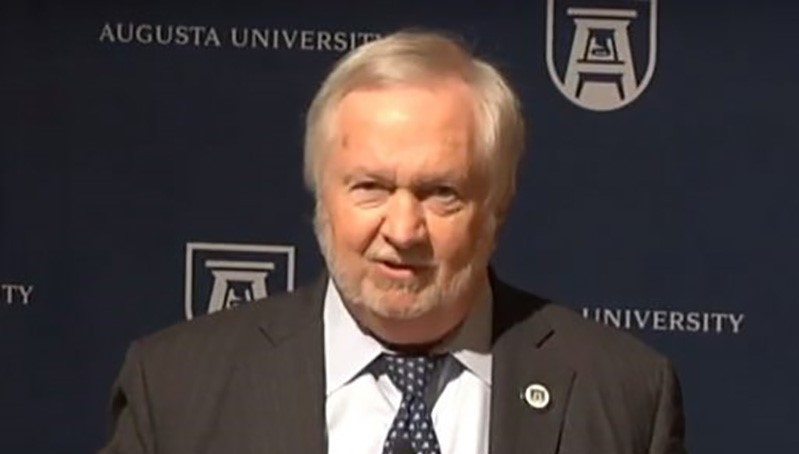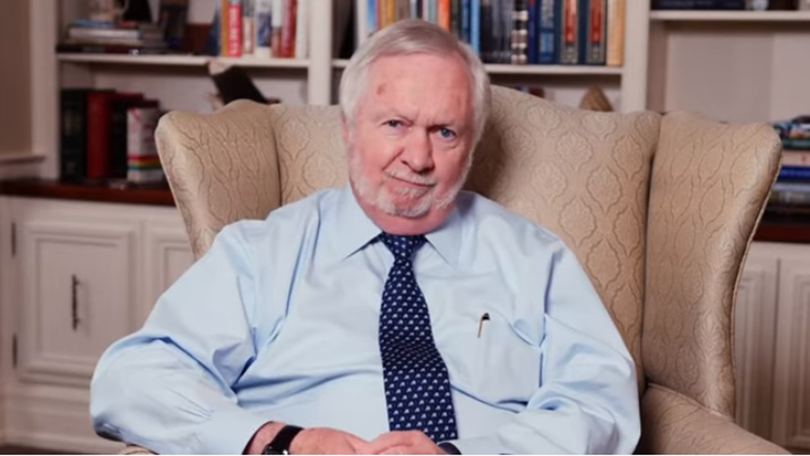The First Five
It’s hard to imagine a more eventful first five years for President Brooks Keel. About the only thing that has remained constant has been change …
and Keel’s inspirational “Go Jags!”
It’s hard to imagine a more eventful first five years for President Brooks Keel. About the only thing that has remained constant has been change …
and Keel’s inspirational “Go Jags!”
When Dr. Brooks Keel, a graduate of the two legacy institutions that make up Augusta University, returned to Augusta in July 2015 to become president of the recently consolidated university, the school was in a very different place than it is now.
It didn’t just have a different name — Georgia Regents University — it had a different feel as well. Formed from two diverse schools — a health sciences university and an undergraduate university a couple of miles away — the new institution suffered from growing pains and an unsettled position in the community underscored by a lack of enthusiasm for the Georgia Regents name.
Now, five years later, not only does the university have a new name, it enjoys a growing prominence in a community that increasingly feels like a college town.
An enterprise with a $2.2 billion economic impact, Augusta University includes a paid workforce of nearly 12,000 people across the state of Georgia and a budget of $2 billion. The university boasts more than 5,000 undergraduate students, and the institution has a graduate component that includes the state’s only dental school and its only public medical school.
In addition, it has a health system that includes the Children’s Hospital of Georgia, the Georgia Cancer Center and the state’s only public academic medical center. It has seven campus locations, 649 clinical teaching sites in Georgia and a research enterprise that earned $110.9 million in sponsored awards in 2019.
“President Keel is not only an accomplished leader and research scientist, he is a great promoter and advocate for higher education in Georgia and for improved access to research and clinical care through the university’s five satellite medical campuses and statewide footprint.”
Though no five-year period at a university this size goes by without note, the first five years of Keel’s presidency have been eventful by any metric.
“We have gone through a lot that I’m not sure Brooks could have predicted when he walked in the door,” says Dr. Karla Leeper, executive vice president for operations. “He’s handled the unexpected really well, and at the same time has kept us focused on our strategic objectives, and that’s really hard to do. It’s been breathtaking, the amount of ground we’ve covered.”
The “unexpected” Leeper talks about was bookended by the name change less than two months after Keel’s arrival and the COVID-19 pandemic of 2020. But peppered throughout have been other major events that weren’t on anyone’s radar, particularly the state of Georgia’s investment in cyber, which accelerated the university’s growth and stature in the computer and cyber sciences.
The “ground gained” is impressive even without the qualifier: Enrollment numbers continue to increase; financial numbers remain strong; and the full enterprise’s work during the pandemic has provided an opportunity to showcase the innovation and expertise that comes with being the state’s designated health sciences university.
“The strength exhibited in the early days of the pandemic had a big role in paving the way for the university’s role as a leader in the state’s fight against COVID-19,” Georgia Gov. Brian Kemp said earlier in the year. “All the things the university did during those first two weeks set the stage for the state to ask Augusta University for help taking COVID-19 testing statewide.”
In March, an in-house, lab-designed COVID-19 test received emergency approval from the U.S. Food and Drug Administration. In April, Augusta University and Augusta University Health partnered with the Georgia Department of Public Health and the Georgia National Guard to coordinate centralized scheduling for nearly 40 COVID-19 specimen point of collection sites. The Dental College of Georgia provided 3D-printed nasal swabs to support the statewide expansion.
As the pandemic progressed, testing options advanced, and in September, Augusta University began offering noninvasive saliva testing for COVID-19.
“I have appreciated Dr. Keel’s support to build an even better future for Georgia’s only public medical school,” says Dr. David Hess, dean of the Medical College of Georgia and executive vice president for medical affairs and integration. “He has supported the growth of our already large class size in our striving to educate more doctors for our state, and he has supported the science that, like our exceptional students, helps distinguish our medical school as we help move medicine forward.”
As a leader, Leeper says Keel is not a micromanager, but instead tells his people where he wants them to go and then lets them get there.
“I think that’s part of the reason why we’ve been able to do all these things, because he’s not down in the weeds,” Leeper says. “He keeps his focus on the high level and keeps us accountable and keeps us moving.”
“The name change was a huge shot in the arm for those who may have felt disenfranchised by the consolidation and disheartened by the original name. What was even more important than that were the marketing, branding and unifying opportunities it provided.”
For Dr. Gretchen Caughman, who retired as provost and executive vice president for academic affairs in August 2020 after 35 years with the institution, that style felt like the right kind of leadership at the right time.
“He will get involved as much as you need him to or want him to,” she says. “He expects whatever it is to be done, but is there if required.”
It’s a style, Leeper says, that has been honed over his career in academia.
An accomplished researcher who moved into administration, first at Florida State University and Louisiana State University and later as president of Georgia Southern University, Keel has remained focused on the student experience and the student’s potential, Leeper says.
“He began as a student and went into a doctoral program in research, and I’m sure he’s thinking, ‘What do I wish I had known going into that and what experiences would have advanced me as a graduate student?’” Leeper says. “So he’s thinking about the continuity of the student coming in the doors as a freshman. He’s always got the long view, and he brings that to the table when we’re planning.”
Not only does he have that focus, Caughman says, but he has the ability to communicate that vision to the many and various constituencies required to hear it.
“He is one who is always intent on positioning Augusta University in the best way, from a state perspective or a local perspective,” Caughman says. “That’s important, and a lot of what a university president should be doing.”
Leeper agrees, pointing to Keel’s numerous Twitter posts and the frequency with which he puts himself in front of the Jaguar community.

"Jaguar Nation is a powerful force and we're all working hard to do all we can for our number one priority: our students and our patients."

"Take heart and know that you have countless faculty, staff and administrators here at Augusta University who care deeply about your education and your well being."
During the pandemic, Keel recorded several video updates and participated in virtual town hall meetings, projecting confidence and disseminating important information.
“When you’re a university president, students and faculty and staff want to feel like they have a personal connection to you,” Leeper says.
In Keel’s case, the connection is genuine, says Russell Keen, chief of staff and executive vice president for external relations.
“I have had the privilege of working alongside Dr. Keel for the past 10 years,” Keen says. “His compassion for students, patients, faculty, staff and everyone who dedicates themselves to Augusta University and AU Health drives him to continue pressing Augusta University and the AU Health System onward and upward.”
While relationships — on campus and off — are a big part of any president’s job, Keel has a special authenticity that comes from being from here.
“He’s of this place,” Leeper says. “He’s proud of it, he likes to talk about it, and that’s a huge part of who he is.”
“The university’s contributions to the community have indeed fostered meaningful collaborations that have created a better and more prosperous Augusta.”
Though it’s tough to calculate the full value of that kind of public advocacy, Hess says one of the payoffs can be found in the quality of the people who are persuaded to join the university.
“He has been a good partner in key recruits, like the recruitment of our chair of the Department of Medicine, Dr. Brian Annex, as a leader who could help build MCG’s largest department and enable a snowball effect of supporting existing faculty and key new faculty who bring new and experienced research and clinical skills and funding and make MCG an even stronger medical school,” he says.
“It comes down to personal relationships,” says Debbie Layman (BSN ‘78), a Medical College of Georgia School of Nursing alumna who has helped establish several scholarships and has been an important figure in the annual Costa Layman Health Fair. “It’s a lot of responsibility and it’s such a diversified portfolio of things you’re responsible for, that the only way to do it is to have an incredible team, which he has and has worked hard to build.”
According to Keen, Keel makes sure that team never loses sight of the people.
“I have seen firsthand how he thoughtfully considers the impact that various events and decisions have on students, patients, employees, internal and external stakeholders, our community and our state,” Keen says. “His big heart toward our students, patients and employees is only matched by his relentless pursuit of advocating for and staying focused on his vision for our institution.”
Leeper agrees.
“He really does care about how all the things we do affect the day-to-day lives of our people, especially during COVID,” Leeper says. “He cares about the people who come through our doors, and that is top of mind in his thoughts, it is top of mind in our cabinet meetings, and it is top of mind in our decision making.”
And while his legacy, when it’s written, might be as a unifier, Leeper feels the role is ultimately limiting.
You can change your name, become one and unify under a logo, she says, but your brand is really your promise.
“One of the struggles this institution had after consolidation was it needed to come together and articulate that promise,” she says. “He has helped us articulate our promise in a way that allows the institution to get behind it and allows everyone to see the opportunity for success in that vision, and that has allowed us to move forward together. I think that’s his greatest accomplishment in the first five years. That steadiness of vision, that commitment, that consistency, that core set of values has kept us all making better decisions.”
© Copyright Augusta University. All Rights Reserved.

For nearly 200 years, Augusta University and its legacy institutions have been centers of learning and drivers of discovery and innovation in Augusta, the state of Georgia and beyond. Our community of alumni, students, faculty and friends are amazing people living incredible lives and making invaluable contributions to our world.
We are pleased to publish four magazines in which we get to tell their stories: